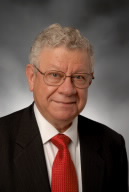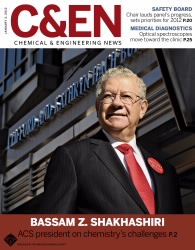Addressing the Needs and Aspirations of Graduate Students
By Bassam Z. Shakhashiri, Ph.D., ACS President, 2012
I would like to thank you in advance for reading this personal message about a new major ACS initiative aimed at strengthening graduate education and research in the chemical sciences. Your engagement in pursuing advanced studies in the chemical sciences is a challenging and highly rewarding undertaking. ACS offers you professional assistance and support and you, in turn, can participate in serving ACS and its mission:
“To advance the broader chemistry enterprise and its practitioners for the benefit of Earth and its people.”
Chemistry brings a wide range of goods and functions to everyone and thus is vital to our democracy. Chemical scientists are essential to progress in our society. We have opportunities to help eliminate debilitating diseases, provide clean water, develop new sources of sustainable clean energy, and contribute to improving the quality of life for people everywhere.
Advanced training in the chemical sciences in the United States is a privilege enjoyed by graduate students, postdoctoral fellows, and faculty at institutions of higher education, at national laboratories, and in parts of industry. For more than half a century, steady financial support for research and education in the chemical sciences has given us high-quality graduate programs that attract talent from around the world. Our research enterprise is populated with highly skilled and intelligent individuals driven by curiosity, by the urge to unravel complexity, and by the awe of designing chemical transformations at the molecular level. Each research project is a journey of the human mind greatly aided by technological advances in instrumentation, housed in magnificent facilities across the land. We have full freedom to pursue open inquiry in addressing important scientific questions and we are entrusted to make wise decisions about the consequences of our findings.
(Peter Cutts Photography)
My ACS presidential theme for 2012 is Advancing Chemistry and Communicating Chemistry. We advance chemistry through research, education, and innovation. Basic research has expanded our understanding of the world around us, aroused our curiosity, and spawned a multitude of inventions that contribute significantly to the quality of life and to the advancement of the human condition. Our critical thinking and analytical approaches expand our horizons in addressing important intellectual matters and solving societal needs related to energy, clean water, safe products, climate change, nutrition, and stewardship of the environment.
Graduate Education Initiative
One of my great concerns as ACS president is sustaining the quality and high impact of scientific training and education in the chemical sciences. I have appointed a blue-ribbon commission to assess the state of graduate education. The charge to the commission is to address two specific questions:
- What are the purposes of graduate education in the chemical sciences?
- What steps should be taken to ensure that these purposes address important societal issues as well as the needs and aspirations of graduate students?
One highly desirable outcome of the commission’s work would be a set of recommendations suitable for immediate action and addressed to all institutions of higher education suggesting strategies to modify graduate education so it serves the needs and aspirations of all graduate students and the needs of society as a whole. One of my goals for this initiative is to have “listening sessions” at ACS national and regional meetings where graduate students, postdocs, faculty, employers, and all concerned can express their views and share their expectations. I welcome your comments on this initiative and look forward to hearing from you. Opinions also can be shared directly with the commission at graduatecommission@acs.org.
Share Your Knowledge
As a chemist and an educator, I am a strong advocate for demonstrating the benefits and progress chemistry provides to the world. In addition to our role in advancing knowledge through open inquiry we have an obligation to share with others our appreciation and understanding of the benefits, potential rewards, and potential risks of science and technology. Everyone should be able to recognize what science is capable of achieving and what it cannot accomplish. It is this level of science literacy that permits our democratic process to work and enables citizens to be skeptical, reject shams, and make informed choices. As chemistry professionals, we have an obligation to boost science literacy by interpreting and explaining the relevancy of our work to nonscientists. At the University of Wisconsin–Madison, we encourage each chemistry doctoral candidate to include a chapter in his or her thesis that explains the research to the public. I encourage you to include such a chapter in your own thesis. View examples here.
Let us be aware of the various elements that contribute to our success as professionals and learned individuals. Our own creativity and our ease of communication flourish because we live in a free society. Along with the freedom to learn and the freedom to pursue our ambitions and dreams comes the responsibility to share and to apply our knowledge wisely. It is not sufficient that we be skilled in doing scientific research. We must always exercise good judgment. As scientist–citizens we have an obligation to use our skills and our knowledge for the benefit of all. That requires each of us to have and adhere to high values and virtues as scientists and citizens of the world. It is in keeping with our obligation to advance chemistry and to communicate chemistry for the benefit of science and for the benefit of society.
Bassam Z. Shakhashiri
2012 ACS President
Professor of Chemistry
University of Wisconsin–Madison
(Dr. Shakhashiri can be reached at b_shakhashiri@acs.org; recommended Web sites www.scifun.org and www.acs.org)
Bassam Z. Shakhashiri, Ph.D., is 2012 President of the American Chemical Society and the William T. Evjue Distinguished Chair for the Wisconsin Idea at the University of Wisconsin-Madison. He is the former assistant director of the National Science Foundation for Science and Engineering Education and internationally noted for leadership in promoting excellence in science education. The Encyclopedia Britannica cites him as the “dean of lecture demonstrators in America.” Shakhashiri‘s scholarly publications, including the multi-volume series, Chemical Demonstrations: A Handbook for Teachers of Chemistry, are models of learning and instruction that have been translated into several languages.




